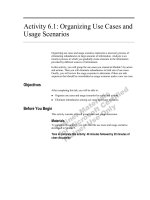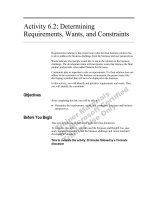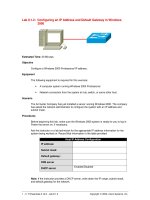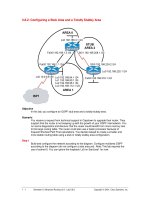6 configuring data protection modes and redo transport services
Bạn đang xem bản rút gọn của tài liệu. Xem và tải ngay bản đầy đủ của tài liệu tại đây (249.81 KB, 27 trang )
6
Configuring Data Protection Modes
and Redo Transport Services
Copyright © 2006, Oracle. All rights reserved.
Objectives
After completing this lesson, you should be able to do the
following:
• Describe the data protection modes
• Change the data protection mode of your configuration
• Modify redo transport services to serve your needs
6-2
Copyright © 2006, Oracle. All rights reserved.
Data Protection Modes and
Redo Transport Modes
• A data protection mode requires a specific redo
transport mode.
• A redo transport mode alone does not define a data
protection mode.
6-3
Copyright © 2006, Oracle. All rights reserved.
Defining the Redo Transport Mode
Use the attributes of LOG_ARCHIVE_DEST_n:
• ARCH and LGWR
– Specify that either the archiver process or the log writer
process is responsible for transmitting redo to the
standby destination
– ARCH is the default.
• SYNC and ASYNC (LGWR only)
– Specify that network I/O operations are to be performed
synchronously or asynchronously when using LGWR
– SYNC is the default.
• AFFIRM and NOAFFIRM
– Ensure that redo has been successfully written to disk on
the standby destination
– NOAFFIRM is the default.
6-4
Copyright © 2006, Oracle. All rights reserved.
Setting the Redo Transport Mode
Click Edit to access the
Edit Standby Database Properties
page.
6-6
Copyright © 2006, Oracle. All rights reserved.
Setting the Redo Transport Mode
Select the mode from
the Log Transport Mode
list.
6-7
Copyright © 2006, Oracle. All rights reserved.
Data Protection Modes
• Three data protection modes:
– Maximum protection
– Maximum availability
– Maximum performance
• Help to balance data availability and system
performance
6-8
Copyright © 2006, Oracle. All rights reserved.
Maximum Protection
• Enables zero data loss
• Redo data must be written to both the local online redo
log and the standby redo log on at least one standby
database.
• Primary database shuts down if a fault prevents it from
writing its redo stream to at least one remote standby
redo log.
• Configuration requirements:
– Standby redo log files on at least one standby database
– SYNC, LGWR, and AFFIRM attributes
for at least one standby database
6-9
Copyright © 2006, Oracle. All rights reserved.
Maximum Availability
• Enables zero data loss
• Provides the highest possible level of data protection
without compromising the availability of the primary
database
• Redo data must be written to both the local online redo
log and the standby redo log on at least one standby
database.
• Primary database does not shut down if a fault prevents
it from writing its redo stream.
• Configuration requirements:
– Standby redo log files on at least one standby database
– SYNC, LGWR, and AFFIRM attributes
for at least one standby database
6 - 10
Copyright © 2006, Oracle. All rights reserved.
Maximum Performance
• Default level of data protection
• Provides the highest possible level of data protection
without affecting the performance of the primary
database
• Transactions can commit as soon as the redo data is
written to the local online redo log.
• Redo stream is written asynchronously with respect to
the commitment of the transactions that create the redo
data.
6 - 11
Copyright © 2006, Oracle. All rights reserved.
Setting the Data Protection Mode
Click the Protection Mode
link.
6 - 12
Copyright © 2006, Oracle. All rights reserved.
Setting the Data Protection Mode
6 - 13
Copyright © 2006, Oracle. All rights reserved.
Setting the Data Protection Mode
by Using the CLI
1. Configure standby redo logs.
2. Set the LogXptMode property (if necessary).
3. Set the data protection mode.
DGMGRL> EDIT DATABASE 'site1_edrsr8p1' SET PROPERTY
'LogXptMode'='SYNC';
DGMGRL> EDIT CONFIGURATION SET PROTECTION MODE AS
MAXAVAILABILITY;
6 - 14
Copyright © 2006, Oracle. All rights reserved.
Setting the Protection Mode
by Using SQL
• You must set attributes to support the type of
protection desired.
• Issue the ALTER DATABASE statement on the primary
database:
ALTER DATABASE SET STANDBY TO MAXIMIZE PROTECTION;
6 - 15
Copyright © 2006, Oracle. All rights reserved.
Delaying the Application of Redo
Production
database
6 - 16
Oracle Net
Delaying the application of redo helps safeguard against:
• Data corruption
• User errors
Delayed
application
Copyright © 2006, Oracle. All rights reserved.
Standby
database
Using Enterprise Manager to Delay
the Application of Redo
Specify the delay in
minutes.
6 - 17
Copyright © 2006, Oracle. All rights reserved.
Setting LOG_ARCHIVE_DEST_n
to Delay the Application of Redo
Use the attributes of LOG_ARCHIVE_DEST_n to control the
application of redo:
• DELAY: number of minutes to delay application of redo
(default: 30 minutes)
6 - 18
Copyright © 2006, Oracle. All rights reserved.
Using Flashback Database
Instead of Apply Delay
Standby1
No delay
Primary
database
Standby2
4-hour delay
Standby3
8-hour delay
Primary
database
6 - 19
Standby
Copyright © 2006, Oracle. All rights reserved.
Additional Attributes That Affect
Redo Transport Services
•
•
•
•
•
6 - 20
ALTERNATE
DEPENDENCY
MAX_FAILURE
NET_TIMEOUT
REOPEN
Copyright © 2006, Oracle. All rights reserved.
Using the ALTERNATE Attribute
• Can specify one alternate destination for the
LOG_ARCHIVE_DEST_n parameter
• Allow a failed destination to change destinations
– Disk full: switch to new disk
– Oracle Net link fails: switch to new network link
• Require REOPEN=0 or MAX_FAILURE
• Enabled with LOG_ARCHIVE_DEST_STATE_n
log_archive_dest_3='SERVICE=stby1_path1 REOPEN=0
ALTERNATE=LOG_ARCHIVE_DEST_4'
log_archive_dest_4='SERVICE=stby1_path2 REOPEN=0
OPTIONAL'
log_archive_dest_state_3=ENABLE
log_archive_dest_state_4=ALTERNATE
6 - 21
Copyright © 2006, Oracle. All rights reserved.
Using the MAX_FAILURE Attribute
MAX_FAILURE[=count]
• Number of times redo transport services attempts to
reestablish communication
• Requires REOPEN
• No default count
log_archive_dest_3='SERVICE=o10g1 LGWR MAX_FAILURE=30
REOPEN'
6 - 22
Copyright © 2006, Oracle. All rights reserved.
Using the NET_TIMEOUT Attribute
• Enables the LGWR process to avoid a network timeout
issue
• Valid with SYNC or ASYNC destinations
• Value supplied is the number of seconds to wait.
• Range of values for NET_TIMEOUT: 15 to 1200
• Default: 180
• Use caution in maximum protection mode.
log_archive_dest_2='SERVICE=o10g2 LGWR SYNC
NET_TIMEOUT=30'
6 - 23
Copyright © 2006, Oracle. All rights reserved.
Using the REOPEN Attribute
• REOPEN[=seconds]
– Minimum number of seconds to wait before retrying a
failed destination at log switch
– Failures can be network failures, quota exceptions, disk
full, and so on.
– Default: 300 seconds (5 minutes)
• REOPEN=0
– Failed destinations remain disabled until:
—
—
—
Manually reenabled
ALTER SYSTEM SET LOG_ARCHIVE_DEST_STATE_n=ENABLE
issued
Instance restart
– Required when using ALTERNATE destinations with
MAX_FAILURE=0 attributes
6 - 24
Copyright © 2006, Oracle. All rights reserved.
Optimized Asynchronous Redo Transmission
Primary
database
transactions
MRP or
LSP
Standby
database
(MRP only)
LNSn
RFS
Oracle Net
LGWR
Online
redo
logs
FAL
Backup
Reports
ARC0
ARC1
ARC2
Archived redo
logs
6 - 25
Archived redo
logs
Copyright © 2006, Oracle. All rights reserved.
Enabling Multiple Connections
for Remote Archival of Redo
The following conditions must be met to enable this
feature:
• Remote archiving is performed to disk.
• LOG_ARCHIVE_LOCAL_FIRST must be set to TRUE
(default).
LOG_ARCHIVE_DEST_3=
'SERVICE=detroit MAX_CONNECTIONS=5'
6 - 26
Copyright © 2006, Oracle. All rights reserved.









